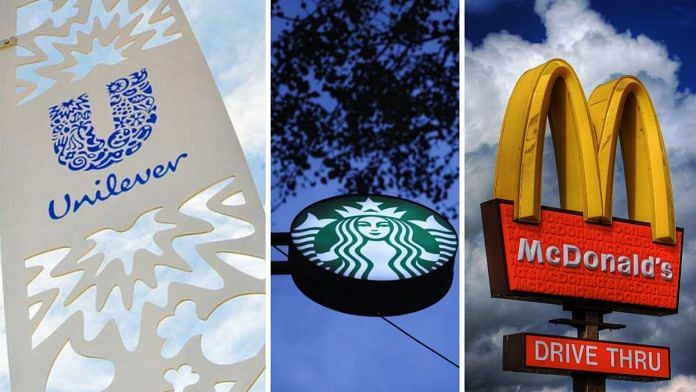New Delhi: The conflict in Gaza has led to a financial blowback for Western firms, including Starbucks, McDonald’s and Unilever, across West Asia and Islamic countries in Southeast Asia. The boycott of these brands by the public in these countries, it is being reported, has also resulted in them considering layoffs.
At least one Starbucks franchise operator in West Asia — the Kuwait-based Alshaya Group — confirmed to CNN Wednesday that it will be laying off employees across its stores in the region due to the “challenging trading conditions” since the start of the conflict in Gaza.
On Tuesday, Reuters first broke the story on the layoffs, adding that the Alshaya Group was planning on laying off at least 2,000 people due to boycotts that the Starbucks brand has been facing across the world since October 2023.
The Alshaya Group has not confirmed the number, however, if true, it would represent a cut of almost 4 percent of its total workforce of about 50,000 people.
Starbucks operates around 1,900 stores across 11 countries in the Middle East and North Africa (MENA) region, employing around 19,000 people.
In January, Starbucks cut its annual sales forecast due to the impact of the conflict in West Asia. It also missed market expectations in the first quarter of the 2023-2024 financial year, Reuters reported.
The Seattle-headquartered coffee chain has been forced to defend itself from being a company that is pro-Israel. The website for its MENA region franchises even has an FAQ section denying any connection to Tel Aviv, or support for its government.
Similarly, other firms, including McDonald’s and Unilever — which owns brands such as Dove, Sunsilk and Rexona — have in past weeks acknowledged how the war has affected its top line in the region.
On 7 October 2023, Hamas — the militant group in control of the Gaza Strip since 2007 — attacked and killed at least 1,200 Israelis and held nearly another 250 hostage. The Israel government in a retaliatory air and ground offensive has since killed at least 30,000 Palestinian civilians, according to Gazan health authorities.
The conflict has seen nearly 1.9 million Palestinians being displaced as a result of Israel’s offensive, which constitutes at least 85 percent of the population in Gaza, according to the UNRWA, the United Nations agency for Palestinian refugees.
Southeast Asia sales impacted
Unilever, the fast-moving consumer goods behemoth, in an earnings call on 8 February acknowledged a double-digit decline in sales in Indonesia during the fourth quarter due to the conflict in Gaza.
“In Indonesia, we saw a double-digit sales decline in the fourth quarter, as sales of several multinational companies were impacted by geopolitically-focused consumer-facing campaigns. The impact was significant in December,” said Fernando Fernandez, the chief financial officer (CFO) of Unilever during the earnings call.
The chief executive officer (CEO) of McDonald’s, Chris Kempczinski, also echoed similar thoughts during the company’s earnings call in February.
“Obviously the place where we are seeing the most pronounced (negative) impact is in the Middle East. We are seeing some impact in other Muslim countries like Malaysia, Indonesia,” Kempczinski said during the earnings call on 5 February.
He added: “So long as this conflict, this war is going on, we are not making any plans, we are not expecting to see any significant improvement. It is a human tragedy, what is going on. And I think that does weigh on brands like ours.”
For Starbucks, the impact is not localised to West Asia alone.
In Malaysia, Berjaya Food Berhad, the main franchise operator of Starbucks, noted a 38.3 percent drop in revenue in the quarter ending December 2023, compared with the same period in 2022.
In its unaudited quarterly (Q2) financial report dated 21 February, Berjaya Food declared revenues totalling RM 182.5 million for the quarter ending 31 December 2023. In 2022, during the same period, the revenue totalled RM 295.33 million.
The company attributed the drop in revenue to the conflict in the Middle East, and subsequent boycott campaigns against Starbucks in the unaudited financial report.
(Edited by Richa Mishra)
Also Read: Israeli forces, dressed as doctors & patients, assassinate 3 in West Bank Hospital



